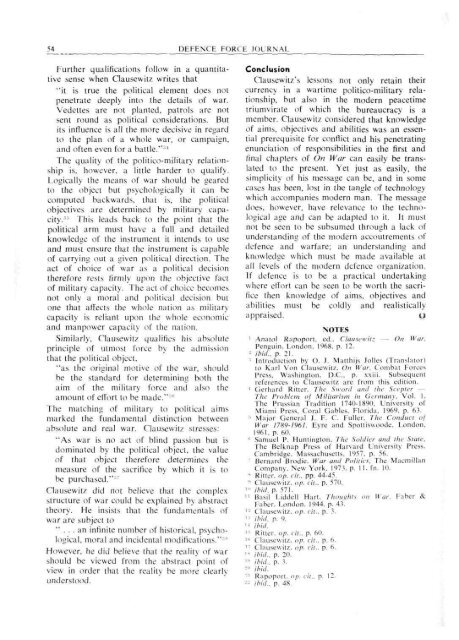ISSUE 3 : Mar/Apr - 1977 - Australian Defence Force Journal
ISSUE 3 : Mar/Apr - 1977 - Australian Defence Force Journal
ISSUE 3 : Mar/Apr - 1977 - Australian Defence Force Journal
Create successful ePaper yourself
Turn your PDF publications into a flip-book with our unique Google optimized e-Paper software.
54 DEFENCE FORCE JOURNALFurther qualifications follow in a quantitativesense when Oausewitz writes that"it is true the political element does notpenetrate deeply into the details of war.Vedettes are not planted, patrols are notsent round as political considerations. Butits influence is all the more decisive in regardto the plan of a whole war, or campaign,and often even for a battle." 34The quality of the politico-military relationshipis, however, a little harder to qualify.Logically the means of war should be gearedto the object but psychologically it can becomputed backwards, that is. the politicalobjectives are determined by military capacity.1. This leads back to the point that thepolitical arm must have a full and detailedknowledge of the instrument it intends to useand must ensure that the instrument is capableof carrying out a given political direction. Theact of choice of war as a political decisiontherefore rests firmly upon the objective factof military capacity. The act of choice becomesnot only a moral and political decision butone that affects the whole nation as militarycapacity is reliant upon the whole economicand manpower capacity of the nation.Similarly. Clausewitz qualifies his absoluteprinciple of utmost force by the admissionthat the political object,"as the original motive of the war, shouldbe the standard for determining both theaim of the military force and also theamount of effort to be made." 36The matching of military to political aimsmarked the fundamental distinction betweenabsolute and real war. Clausewitz stresses:"As war is no act of blind passion but isdominated by the political object, the valueof that object therefore determines themeasure of the sacrifice by which it is tobe purchased." 37Clausewitz did not believe that the complexstructure of war could be explained by abstracttheory. He insists that the fundamentals ofwar are subject to"... an infinite number of historical, psychological,moral and incidental modifications." 3 "However, he did believe that the reality of warshould be viewed from the abstract point ofview in order that the reality be more clearlyunderstood.ConclusionClausewitz's lessons not only retain theircurrency in a wartime politico-military relationship,but also in the modern peacetimetriumvirate of which the bureaucracy is amember. Clausewitz considered that knowledgeof aims, objectives and abilities was an essentialprerequisite for conflict and his penetratingenunciation of responsibilities in the first andfinal chapters of On War can easily be translatedto the present. Yet just as easily, thesimplicity of his message can be, and in somecases has been, lost in the tangle of technologywhich accompanies modern man. The messagedoes, however, have relevance to the technologicalage and can be adapted to it. It mustnot be seen to be subsumed through a lack ofunderstanding of the modern accoutrements ofdefence and warfare; an understanding andknowledge which must be made available atall levels of the modern defence organization.If defence is to be a practical undertakingwhere effort can be seen to be worth the sacrificethen knowledge of aims, objectives andabilities must be coldly and realisticallyappraised.uNOTES1 Anatol Rapoport, ed.. Clausewitz — On War.Penguin. London. 1968. p. 12.- ibid., p. 21.8Introduction by O. J. Matthijs Jolles (Translator)to Karl Von Clausewitz. On War, Combat <strong>Force</strong>sPress. Washington. D.C.. p. xxiii. Subsequentreferences to Clausewitz are from this edition.4 Gerhard Ritter. The Sword and the Scepter -The Problem of Militarism in Germany, Vol. 1,The Prussian Tradition 1740-1890. University ofMiami Press. Coral Gables. Florida. 1969, p. 63.1Major General J. F. C. Fuller. The Conduct ofWar I7fl°-I961, Eyre and Spottiswoode. London.1961. p. 60.''• Samuel P. Huntington. The Soldier and the State,The Belknap Press of Harvard University Press.Cambridge. Massachusetts. 1957. p. 56.7Bernard Brodie. War and Politics, The MacmillanCompany. New York. 1973. p. 11, to. 10." Ritter. o'p. cit., pp. 44-45.• Clausewitz. op. cit-, p. 570.1,1 ibid. p. 571.» Basil Liddell Hart. Thoughts on War. Faber &Faber. London. 1944. p. 43.I - Clausewitz. op. cit., p. 3.13ibid, p. 9.II18ibid.Ritter. op. cit.. p. 60."'• Clausewitz. op. cit., p. 6.1T Clausewitz. op. cit., p. 6.'« ibid., p. 20."' ibid., p. 3.-" ibid." Rapoport. op, cit., p. 12.» ibid., p. 48.
















